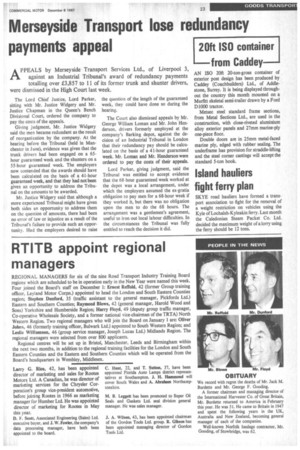Merseyside Transport lose redundancy
Page 25

If you've noticed an error in this article please click here to report it so we can fix it.
APPEALS by Merseyside Transport Services Ltd., of Liverpool 3, against an Industrial Tribunal's award of redundancy payments totalling over £3,857 to 11 of its former trunk and shunter drivers, were dismissed in the High Court last week.
The Lord Chief Justice, Lord Parker, sitting with Mr. Justice Widgery and Mr. Justice Chapman in the Queen's Bench Divisional Court, ordered the company to pay the costs of the appeals.
Giving judgment, Mr. Justice Widgery said the men became redundant as the result of reorganization by the company. At the hearing before the Tribunal (held in Manchester in June), evidence was given that the trunk drivers had been engaged on a 65hour guaranteed week and the shunters on a 55-hour guaranteed week. The employers now contended that the awards should have been calculated on the basis of a 41-hour guaranteed week, and that they had not been given an opportunity to address the Tribunal on the amounts to be awarded.
Mr. Justice Widgery said that although a more experienced Tribunal might have given both sides an opportunity to address them on the question of amounts, there had been no error of law or injustice as a result of the Tribunal's failure to provide such an opportunity. Had the employers desired to raise the question of the length of the guaranteed week, they could have done so during the hearing.
The Court also dismissed appeals by Mr. George William Loman and Mr. John Henderson, drivers formerly employed at the company's Barking depot, against the decision of an Industrial Tribunal in London that their redundancy pay should be calculated on the basis of a 41-hour guaranteed week. Mr. Loman and Mr. Henderson were ordered to pay the costs of their appeals.
Lord Parker, giving judgment, said the Tribunal was entitled to accept evidence that the 68-hour guaranteed week worked at the depot was a local arrangement, under which the employers assumed the ex-gratia obligation to pay men for a 68-hour week if they worked it, but there was no obligation upon the men to do the 68 hours. The arrangement was a gentlemen's agreement, useful to iron out local labour difficulties. In the circumstances the Tribunal was fully entitled to reach the decision it did.








































































































